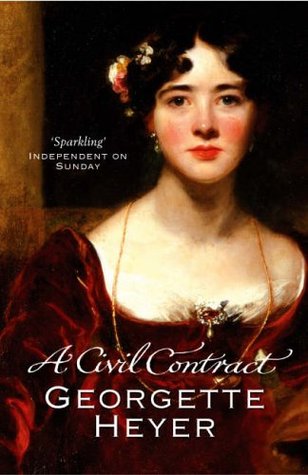Thursday, August 26, 2010
Civil Contract
Civil Contract. Georgette Heyer. 1961/2009. Harlequin. 432 pages.
"The library at Fontley Priory, like most of the principal apartments in the sprawling building, looked to the south-east, commanding a prospect of informal gardens and a plantation of poplars, which acted as a wind-break and screened from view the monotony of the fen beyond."
Okay, so that first sentence doesn't even hint at what the story is about. And it offers little incentive to the reader. Fortunately, most readers need only hear Georgette Heyer's name to know that this may be a gem of a book. For those that aren't the "most" in the readers listed above, I'd like to think I'm doing my part. A Civil Contract is a satisfying read in a very gentle and subtle manner. I enjoyed it. Enjoyed the characters and the subtle complexities of its non-plot. This is a very human novel.
You're probably wondering, but what is it about??? Adam Deveril is a soldier whose father has just died. He's inherited a title--he's now Viscount Lynton--but he's also inherited an overwhelming debt. A debt that is due to negligence, gambling, and mismanagement. He's got a mother (Dowager is how she's referred to in the text), and two sisters Charlotte and Lydia. Charlotte is engaged to be married, so she's not one of his primary concerns. However, his mother and sister are. He's been advised that he should marry for money. He finds the idea repugnant. Especially at first. But even Lydia, his younger sister, knows that sacrifices are called for in this occasion. It is her discussions of how she needs to be marry an older man for his money to "rescue" the family, that has Adam pondering how much he's willing to do for his family.
The family home, Fontley, is at risk. All their property is at risk--most of their holdings are mortgaged already. And only their townhouse and Fontley remain. Adam feels that the honorable thing to do would be to sell everything they can and hope to break even. That is hope they have enough money to settle their debts. Whatever small amount may be left would be settled upon his sister for her dowry. He's not worried so much for himself, for his comfort. He knows that he can go soldiering again and live on his pay if need be.
Of course, this newly-discovered money problem does mean that he cannot marry his first love, his supposed one and only love Julia Oversley. They met when he was injured. She became enamored with a vision of a dashing, heroic soldier. He became enamored of her beauty and charm. The parents consented at the time, though Lord Oversley did feel they weren't well suited for one another. But now that he's poor and soon to be without a home, he knows the only honorable thing is to break the engagement. Oversley does agree with him. Julia's brokenhearted. Adam is melancholy but resolved that he's doing the right thing, the responsible thing.
Enter Jonathan Chawleigh. A very wealthy man, but not "genteel" or gentle bred. Oversley introduces the impoverished Adam to Chawleigh with the hopes that they can solve each other problems. Chawleigh has high hopes for his daughter, his only child, Jenny. He wants to see her marry a proper gentleman, a man with a title, a man with dignity and distinction. A man that is part of the ton. Adam is shocked at first, but the more he considers the idea, the more he comes to feel it would be doing the better thing for his family--his mother and sister. The couple does meet first. And Chawleigh was right, Jenny doesn't overwhelm men with her beauty and charm and grace. She's the opposite of Julia in a way. Shy. Intelligent. Meek. Forgiving. Generous. Unassuming. And practical. Above all else practical. For those that are familiar with it, think Proverbs 31. Jenny is the essence of a Proverbs 31 woman. So after meeting her, while not overwhelmed by her beauty, he sees that they could live together amicably. They'd "suit" each other. Neither is dishonest. She knows that her husband is in love with another woman. He knows that she knows he's in love with another woman. Yet this awkward situation somehow doesn't stay awkward. Not for long. She doesn't demand love. Her only hope--in the beginning--is for respect and dignity.
I loved Jenny. I did. I loved her father Jonathan. The scenes with him are just satisfyingly good. I loved Adam's aunt Lady Nassington. I loved Adam's sister Lydia. So many of the characters were just so wonderfully human, so thoroughly developed. I loved this quiet and gentle but always intelligent novel about marriage and love and family.
I wouldn't say that I liked A Civil Contract better than A Convenient Marriage. But it was so much better than April Lady!
© Becky Laney of Becky's Book Reviews
Labels:
1961,
2009,
adult fiction,
Georgette Heyer,
Historical Fiction,
romance
Subscribe to:
Post Comments (Atom)


1 comment:
You really make me want to read some Heyer. I could use gentle and subtle read.
Post a Comment